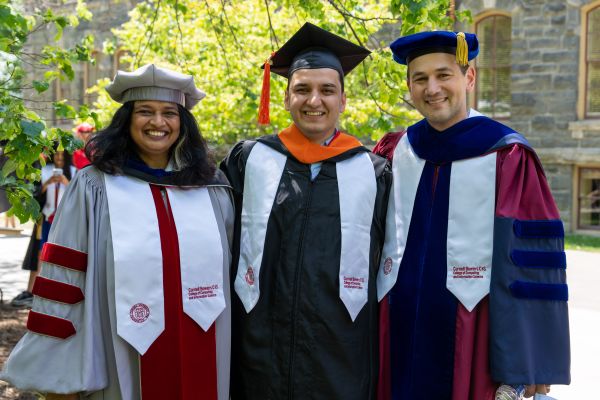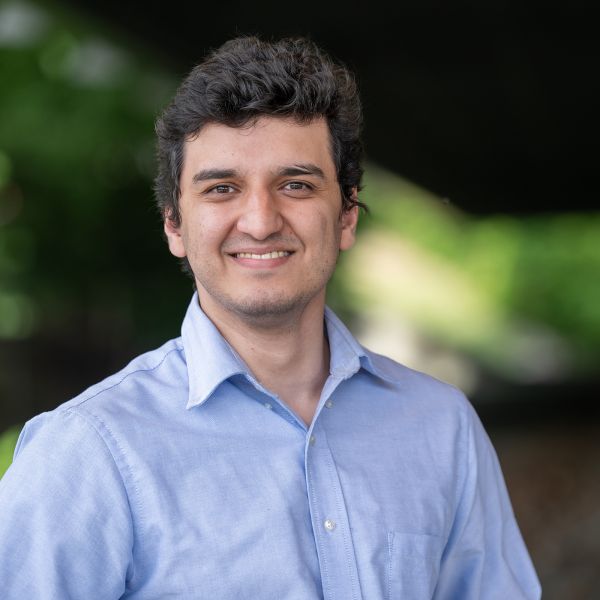June 10, 2024
By Patricia Waldron
In 2021, Hussain Ahmad Mohammad, M.Eng, ’23, thought a Fulbright scholarship was his ticket to advance his career and country. At the time, he was a Fulbright semifinalist with plans to study systems and networking at a U.S. university, then return to Afghanistan to improve internet access in rural areas.
But when the U.S. military pulled out of Afghanistan in August 2021, the Taliban returned to power and diplomatic relations between the countries ended. For Mohammad and about 100 other Fulbright semifinalists, that ticket to the U.S. evaporated.
With support from the Cornell Ann S. Bowers College of Computing and Information Science, and a lot of hard work and persistence, Mohammad realized the first part of his plan and completed his Masters of Engineering in computer science. Now, he is heading to graduate school, where he hopes to tackle complex problems in the area of systems and networking – and perhaps one day improve internet connectivity for users everywhere.
“Cornell was a dream school for me,” he said. “Never in my dreams, I would have thought that I'll make it to Cornell.”
A childhood split between Afghanistan and Pakistan
Jalalabad in Afghanistan is where Mohammad’s family calls home, but due to political unrest in his country, they moved to Peshawar, just across the border in Pakistan, before Mohammad was born. His father worked as a trader in Peshawar, affording Mohammad the opportunity to attend good schools. When his family moved back to Afghanistan in 2002, Mohammad stayed behind for school, visiting only for holidays and summer vacations.
As a child, Mohammad’s first experience of the wider world was through the internet. In Pakistan in 2005, internet access was expensive and limited. But as long as he took turns with family members and promised not to use all the bandwidth, Mohammad could get help with homework, play games with friends, and explore life beyond his local community.
“I could see the whole world,” Mohammad said. “It was like I had everything on my laptop. I had the opportunity of looking at different cultures, different countries, different schools – different things happening in the world and different technologies that were changing lives for the betterment of society.”
Mohammad wanted to do his undergraduate degree in the U.S. but received a scholarship to the Institute of Management Sciences in Peshawar, where he majored in computer science. To continue his studies, he applied for a Fulbright scholarship. The Fulbright Program funds international recipients to pursue graduate degrees at U.S. institutions before returning to their home countries.
“The Fulbright scholarship was one way I could go to the U.S.,” Mohammad said. “Every great thing happening in CS [computer science] is in the U.S.”
When the Fulbright program in Afghanistan ended suddenly, Mohammad and about 100 other semifinalists took to Twitter to campaign for the program to continue. The Los Angeles Times ran a story on their plight, stating Mohammad’s desire to study computer science at Cornell.
That’s when the administration at Cornell Bowers CIS reached out to see what they could do to help.
Finding a home at Cornell
Kavita Bala, dean of Cornell Bowers CIS, asked Ken Birman, the N. Rama Rao Professor of Computer Science, to contact Mohammad. They talked over WhatsApp about Mohammad’s academic interests and the loss of the Fulbright opportunity. “Over the time I was talking to him, you could hear his dream getting chipped away,” Birman said.

Mohammad also talked with Nate Foster, professor of computer science. “He was very passionate about the vision he had for bringing network technology to Afghanistan,” Foster said. “He wanted to build a series of community ISPs [internet service providers] to proliferate network connectivity into parts of Afghanistan that didn’t have it.”
It became clear that Cornell Bowers CIS couldn’t revive his scholarship, but they could scrape together some funding. Foster ultimately agreed to take him on as a Masters of Engineering student.
On January 18, 2022, Mohammad touched down at John F. Kennedy International Airport in New York City. He recalls being “awestruck” by the city. After a visit to Times Square, a friend drove Mohammad up to Ithaca and the semester started three days later.
The first semester was challenging, Mohammad said. He had a heavy course load with rigorous classes that were not in his first language. He was also starting his research, auditing additional classes and learning how to navigate the university – all while getting settled in a new place. Mohammad credits advising from Foster and Birman and the help of his friends for encouraging him that first semester.
“He was just incredibly persistent and resilient,” Foster said. “Cornell is not an easy place, especially when you’re just figuring out the system.”
Building more secure networks
For the research component of his degree, Mohammad worked on programmable networks – a type of network in which the flow of information and the behavior of network devices are controlled by software that operates independently of network hardware.
He developed a system that will allow network operators to add rules to a programmable switch – a small device that can be programmed to control the flow of data on a network – so that it acts like a firewall. The system filters out malicious packets of information, such as malware sent from an insecure website that could take down a network. Mohammad worked with a team from Cornell Information Technologies (CIT) to determine how they could deploy the system inside the Cornell network. They also looked at whether the approach was faster and less costly than other approaches that require extra hardware or additional servers to process packets.
Mohammad received a grant for a third semester at Cornell and ultimately graduated in Spring 2023. His family could not attend graduation in person, but saw him walk across the stage on the livestream. “That’s the power of the internet – they could watch my graduation ceremony live from Peshawar,” Mohammad said. “It was like they were there.”
After graduation, Mohammad stayed on in Foster’s lab as a network engineer. He set up a test bed for a 5G cellular network to be used for research to yield more secure computer networks. He also automated the server deployment for the lab, organized digital storage and helped out with a project to use machine learning for network management.
In the fall, he plans to begin his Ph.D. in computer science, specializing in systems and networking with the goal of solving challenging internet infrastructure problems.
“How can we enable the power of the internet?” Mohammad said. “Not just in Afghanistan, but across the U.S. and [other] places where the internet is not working out for many people.”
Foster and many at Cornell Bowers CIS are excited to see where he goes from here.
“I'm proud of all my students, but to see his growth over the two years he's been with us and then to succeed in such spectacular fashion, is nice as an educator,” Foster said. “If you can facilitate these kinds of life-changing opportunities for people, that's really gratifying.”
“Here’s somebody who was stranded and we unstranded him,” Birman said. “His dream was to go to Cornell, and he actually did come to Cornell. And it's got him going on to the next stage.”
Patricia Waldron is a writer for the Cornell Ann S. Bowers College of Computing and Information Science.



